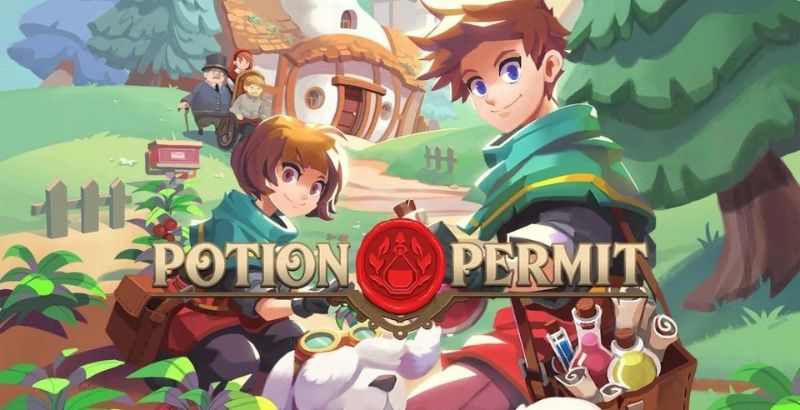
Potion Permit is a new take on the genre of cozy role-playing games that feels quite refreshing. Developed by MassHive Media and published by PQube, Potion Permit is a refreshing rendition of a genre that can often feel played out.
Potion Permit takes place in the town of Moonbury, a quaint little town full of lovely citizens. Players take on the role of a chemist who has come to town in order to establish a clinic. The main character is brought to Moonbury at the request of the mayor, Myer, in order to help cure his daughter Rue after previous attempts have failed. Instead of welcoming the character, the town is incredibly wary of the new chemist because of previous experiences they’ve encountered. I was not expecting the town to be so unwelcoming to the main character, but it is an approach I really appreciated. It really drives home the importance of building relationships with the townspeople, something that can sometimes feel rote in similar games.
The characters of Moonbury are where Potion Permit really shines. The interactions are incredibly cold at first, but as the clinic becomes established and the various ailments of the townspeople have been cured the people of Moonbury begin to really open up. The various non-player characters all have different quests that must be completed in order to advance the relationships, which I will get into a bit more later on. I appreciated the way characters changed as you do more for the town and the variety of character personalities felt refreshing even if the quests did not. There is a noticeable shift in the entire vibe of Moonbury as you work harder to establish the clinic, and the subtle changes in character interactions are as interesting as some of the larger-scale changes in the town.
The quests in Potion Permit are, unfortunately, quite monotonous. The bulk of the game is centered around finding out what treatments various characters need and then crafting the potions needed to cure the ailments. Potions are crafted by obtaining ingredients from around the various biomes in the game and fitting them into a Tetris-like puzzle that get more complex as the game goes on.

The core concept of this gameplay loop starts off really interesting, especially as you learn to solve the puzzles for the first time. The problem, is, once a puzzle is “solved” it leads to a constant repetitive loop. The other massive problem is that there are finite resources in the world, and many of the potions require players to reset the day multiple times in order to get the number of ingredients they need. It was incredibly frustrating to spend almost 20 in-game days in order to just get the amount of wood I needed to get upgrades built. Most ingredients and supplies can be purchased, but the gold is better spent being saved for later game upgrades so the repetitive loop of farming supplies becomes necessary.
While I was really frustrated with the repetitive grind in Potion Permit, it was made slightly less annoying by how beautiful the world itself is. Going back and forth from your house to chop down trees over and over again might not sound appealing, but the scenery along the path makes it at least nice to look at every time. The buildings throughout Moonbury also all have their own distinct look, and the town manages to look really unique without much repetitiveness at all. There was clearly a lot of care given to the visual design of Potion Permit and it pays off quite well, managing to keep me engaged even when the gameplay began to get frustrating.
Potion Permit is a hard game to pin down. It manages to give a refreshing take on the genre, but some of the mundane tasks often felt like bashing my head into a wall over and over again. Potion Permit feels like a nice cup of hot chocolate on an unseasonably warm day. Sure, it tastes good and the thought of it is great, but in practice maybe some things need improvement for it to truly be great.
Potion Permit is out now on PC, Xbox, PlayStation 4/5, and Nintendo Switch.
Potion Permit
-
Rating - 7/107/10
TL;DR
Potion Permit is a hard game to pin down. It manages to give a refreshing take on the genre, but some of the mundane tasks often felt like bashing my head into a wall over and over again. Potion Permit feels like a nice cup of hot chocolate on an unseasonably warm day. Sure, it tastes good and the thought of it is great, but in practice maybe some things need improvement for it to truly be great.






